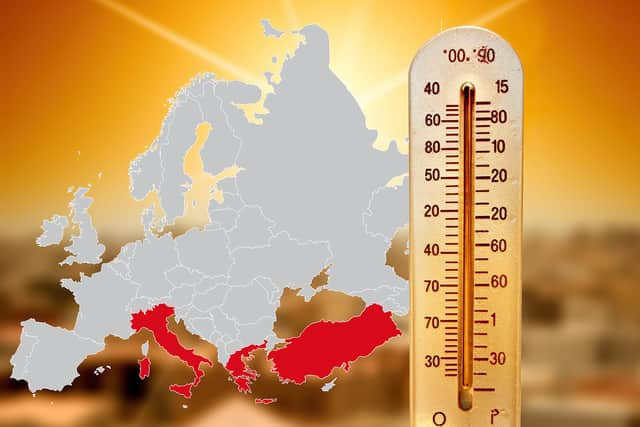Cerberus heatwave: What travellers need to know as holiday hotspots face record-breaking temperatures
and live on Freeview channel 276
Popular holiday hotspots across Southern Europe and Northwest Africa have been caught in the grips of a dangerous heatwave, just as thousands of British families prepare to jet off overseas for the summer school break.
The Cerberus heatwave - named by the Italian Meteorological Society after the three-headed monster in Dante’s Inferno - has already claimed at least one life as it sweeps across the Mediterranean. The Met Office has warned peak temperatures across the region are likely to be 10C to 15C higher than average - and could reach the mid-40s in Southern Europe, and up to 50C in parts of North Africa.
Advertisement
Hide AdAdvertisement
Hide AdThis comes just days after the hottest week on record was announced - which itself fell after the hottest June on record - as scientists warn climate change continues to raise average temperatures across the globe.
But what does the latest heatwave - at one of the UK's peak travel periods - mean for Britons heading to Italy or Spain, and how do experts recommend they stay safe in extreme heat conditions?
Here is everything you need to know:


Which holiday hotspots are being impacted by the extreme heart?
A number of countries across Southern Europe and Northern Africa have either reached or are approaching heatwave conditions.
The Turkish State Meteorological Service forecasts temperatures of 47C in Turkey this weekend, while Spain is set to hit 40C in Seville on Thursday (13 July), and in Navarre on Friday - with the Canary Islands also reaching 41C on Thursday.
Advertisement
Hide AdAdvertisement
Hide AdGreece is poised to reach 44C on Friday, according to the Hellenic National Meteorological Service, while MateoFrance warns the country could see temperatures of up to 37C on 18 July.
In Italy, high heat alerts were issued for 10 cities this week, from northern Bolzano down to Bologna, Florence and Rome - as temperatures hit 40C in Sardinia on Wednesday. The country is also wrestling with severe storms across the Lombardy region, causing flooding and damage to buildings.
What should UK travellers do to stay safe?
Dr Agostinho Sousa, head of extreme events and health protection at the UK Health Security Agency, told NationalWorld there were a number of ways in which people could keep themselves and others safe during periods of hot weather.
"While many people enjoy warmer summer weather, hot weather can cause some people to become unwell through overheating - becoming uncomfortably hot - dehydration, heat exhaustion and heatstroke," he said.
Advertisement
Hide AdAdvertisement
Hide Ad"Cover up with suitable clothing such as an appropriate hat and sunglasses, seek shade and apply sunscreen," Dr Sousa advised. He also told travellers to drink plenty of fluids, and limit their alcohol intake.
Travellers who might be at more risk of becoming unwell at high temperatures - such as young children, people over 65, or people taking some medications - should ask friends and family to check in with them regularly. Dr Sousa also advised holidaymakers to know the symptoms of heat exhaustion and heatstroke, and what to do if they or someone else has them.
"Listen to the news and check the weather forecast for the areas you are travelling to," he urged Britons, and "follow the heat and wildfires guidance provided by the country authorities".
Comment Guidelines
National World encourages reader discussion on our stories. User feedback, insights and back-and-forth exchanges add a rich layer of context to reporting. Please review our Community Guidelines before commenting.
